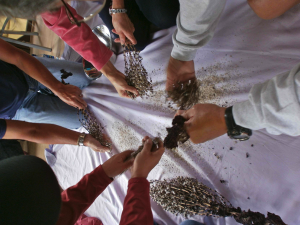 Open-pollinated seed diversity is being lost at a rapid rate. A study conducted by the Rural Advancement Foundation International compared United States Department of Agriculture (USDA) listings of seed varieties sold by commercial U.S. seed houses in 1903 to those in the National Seed Storage Laboratory in 1983. Of the 66 crops surveyed, 93% had gone extinct—the biodiversity of our food supply is ebbing away. Farmers and breeders developed food crops well suited to their local climates for more than 10,000 years (Charles Siebert, Food Ark, National Geographic, 2011). These varieties were the backbone of home gardens and market farms for centuries.
Open-pollinated seed diversity is being lost at a rapid rate. A study conducted by the Rural Advancement Foundation International compared United States Department of Agriculture (USDA) listings of seed varieties sold by commercial U.S. seed houses in 1903 to those in the National Seed Storage Laboratory in 1983. Of the 66 crops surveyed, 93% had gone extinct—the biodiversity of our food supply is ebbing away. Farmers and breeders developed food crops well suited to their local climates for more than 10,000 years (Charles Siebert, Food Ark, National Geographic, 2011). These varieties were the backbone of home gardens and market farms for centuries.
A Hawai‘i Statewide Seed Assessment was conducted in 2010 in which 131 people participated. The goal of this Seed Assessment was to gather information regarding the existing numbers of seed growers, level of seed knowledge and potential level of interest for further seed education. Information gathered from this assessment was used to assist in planning a comprehensive program for a two-day Seed Symposium, “Hua ka Hua—Restore Our Seed” in 2010, as well as gather information necessary for creating a long-range working plan for a viable seed network. The Kohala Center received a grant through the USDA’s Organic Agriculture Research and Extension Initiative to create a Seed Symposium for statewide participants in the spring of 2010.
» View Hawai‘i Statewide Seed Assessment Survey Results
The Hawai‘i Public Seed Initiative (HPSI), a statewide network of seed working groups, emerged in 2011 as a result of this Symposium. HPSI continues its work across the islands to increase seed knowledge, quality, and production, and expand the availability of high-quality, locally adapted seed for home gardeners, small farmers, and potential future markets.

